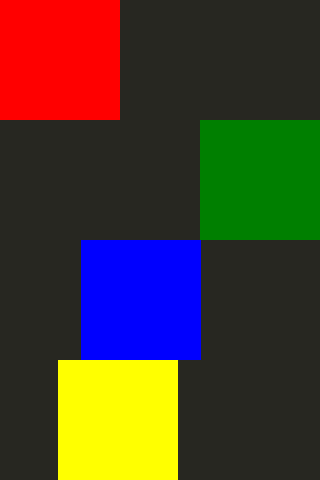用例 - QML中的动画¶
如何在QML应用程序中包含动画的示例
Qt Quick 提供了动画属性的能力。动画属性允许属性值通过中间值逐渐变化,而不是立即改变到目标值。要动画化项目的位置,你可以动画化控制项目位置的属性,例如 x 和 y,这样项目的位置在到达目标位置的过程中每一帧都会发生变化。
流畅的用户界面¶
QML 旨在促进流畅用户界面的创建。这些用户界面中的组件会以动画形式呈现,而不是突然出现、消失或跳跃。Qt Quick 提供了两种简单的方法,使 UI 组件能够通过动画移动,而不是立即出现在新位置。
状态和转换¶
Qt Quick 允许您在 State 对象中声明各种 UI 状态。这些状态由基础状态的属性变化组成,可以是组织 UI 逻辑的有用方式。Transitions 是您可以与项目关联的对象,用于定义其属性在因状态变化而改变时的动画方式。
可以使用Item::states和Item::transitions属性来声明项目的状态和转换。状态通常在组件的根项目的states列表属性中声明。定义在同一项目上的转换用于动画化状态的变化。以下是一个示例。
Item { id: container width: 320 height: 120 Rectangle { id: rect color: "red" width: 120 height: 120 TapHandler { onTapped: container.state === '' ? container.state = 'other' : container.state = '' } } states: [ // This adds a second state to the container where the rectangle is farther to the right State { name: "other" PropertyChanges { target: rect x: 200 } } ] transitions: [ // This adds a transition that defaults to applying to all state changes Transition { // This applies a default NumberAnimation to any changes a state change makes to x or y properties NumberAnimation { properties: "x,y" } } ] }
动画属性变化。¶
行为可以用来指定属性在变化时使用的动画。然后这将应用于所有变化,无论它们的来源如何。以下示例使用行为来动画化一个在屏幕上移动的按钮。
Item { width: 320 height: 120 Rectangle { color: "green" width: 120 height: 120 // This is the behavior, and it applies a NumberAnimation to any attempt to set the x property Behavior on x { NumberAnimation { //This specifies how long the animation takes duration: 600 //This selects an easing curve to interpolate with, the default is Easing.Linear easing.type: Easing.OutBounce } } TapHandler { onTapped: parent.x == 0 ? parent.x = 200 : parent.x = 0 } } }
其他动画¶
并非所有动画都必须与特定属性或状态相关联。您还可以更一般地创建动画,并在动画内部指定目标项和属性。以下是一些不同方法的示例:
Item { width: 320 height: 120 Rectangle { color: "blue" width: 120 height: 120 // By setting this SequentialAnimation on x, it and animations within it will automatically animate // the x property of this element SequentialAnimation on x { id: xAnim // Animations on properties start running by default running: false loops: Animation.Infinite // The animation is set to loop indefinitely NumberAnimation { from: 0; to: 200; duration: 500; easing.type: Easing.InOutQuad } NumberAnimation { from: 200; to: 0; duration: 500; easing.type: Easing.InOutQuad } PauseAnimation { duration: 250 } // This puts a bit of time between the loop } TapHandler { // The animation starts running when you click within the rectangle onTapped: xAnim.running = true } } } Item { width: 320 height: 120 Rectangle { id: rectangle color: "yellow" width: 120 height: 120 TapHandler { // The animation starts running when you click within the rectangle onTapped: anim.running = true; } } // This animation specifically targets the Rectangle's properties to animate SequentialAnimation { id: anim // Animations on their own are not running by default // The default number of loops is one, restart the animation to see it again NumberAnimation { target: rectangle; property: "x"; from: 0; to: 200; duration: 500 } NumberAnimation { target: rectangle; property: "x"; from: 200; to: 0; duration: 500 } } }
有关动画的更多信息可以在Qt Quick中的重要概念 - 状态、过渡和动画页面上找到。